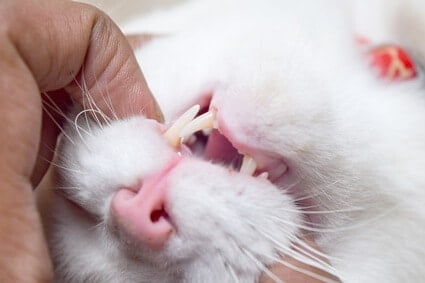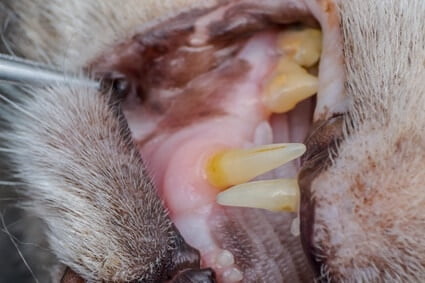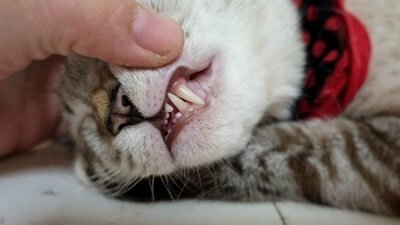Tooth loss in older cats happens, but it’s not normal. When senior cats lose their teeth, a dental issue, dietary imbalance, or injury is most likely to blame.
Senior cats are most likely to lose their teeth due to:
- Dental disease and decay (tooth resorption)
- Trauma caused by accidents and injuries
- Unbalanced diet (lack of phosphorus, potassium, calcium, and magnesium)
- Compromised gums (periodontal disease)
You can keep your senior cat’s teeth strong and healthy by brushing them at least twice weekly. Not all cats will allow this, though, If so, providing a dental prescription diet or dental cat toys and treats is beneficial.
Do Senior Cats Lose Their Teeth?
If you’re wondering, “is it common for older cats to lose teeth?” the answer is no. While teeth loss is common for kittens to lose their baby teeth, adult cats shouldn’t lose their teeth.
Even though accidents happen where teeth become dislodged from the mouth, tooth loss is often the sign that something’s not right with your cat’s oral health. However, this isn’t always the case, as aging cats are more susceptible to losing their teeth.
Tooth loss is the result of:
Dental Disease
Senior cats lose their teeth due to dental disease, which is one of the most common feline afflictions.
According to the Cornell Feline Health Center, approximately 50-90% of cats older than 4 have dental disease. Most of these issues are preventable with the right care.
The most common dental hygiene issues affecting senior cats include:
Gingivitis
Gingivitis occurs when the gingiva (the gums surrounding the teeth) become red and swollen.
Signs include:
- Bad breath
- Drooling
- Weight loss
- Irritability
- Isolation or frequent hiding
It begins with a buildup of plaque, which is a slime that harbors bacteria on the teeth. In cats with healthy mouths, this can be beneficial. However, as time goes by, the plaque accumulates, and the gingiva becomes more inflamed, beginning the process of gum recession.
Senior cats are most at risk of severe gingiva because the plaque’s gone unnoticed and untreated for so long. When the cat’s oral health reaches this stage, it becomes painful to eat and drink, leaving cats vulnerable to nutritional deficiencies and malnourishment.
Cats with feline leukemia virus, feline immunodeficiency virus, feline calicivirus, and autoimmune diseases enhance the symptoms of gingivitis. It’s also caused by a lack of dental care or misaligned teeth.
Periodontitis
Periodontitis is the next stage of gingivitis and is irreversible when it becomes too advanced. Periodontitis occurs when the tissues that attach the tooth to the gums and bone weaken. This is due to the damaging substances caused by disease-causing bacteria. The cat’s immune system also causes inflammation.
Over time, the supporting structures that support the teeth become compromised, causing tooth loss. Sometimes, only one tooth becomes dislodged, but multiple teeth fall out in severe cases.
Controlling gingivitis is the first step to preventing periodontitis. Senior cats with the condition develop redness, swelling, and bleeding along the gingiva at the base of the teeth, so frequently check inside your cat’s mouth for any symptoms.
Tooth Resorption
Tooth resorption is where the tooth structure breaks down inside the tooth before affecting other parts of the teeth. It’s the most common cause of tooth loss in cats, with 30-70% of cats showing at least one sign.
It’s unknown why tooth resorption occurs, but the main sign of the condition is a pinkish effect in the teeth line where the tooth meets the gums. When this appears, the tooth’s significantly damaged. It’s a painful condition, and cats with it suffer from:
- Eating difficulties
- Drooling
- Turning their heads uncomfortably while eating
- Irritability
While tooth resorption can’t be cured, a vet can manage the pain and prevent the condition from getting worse. They may also be able to restore some of the tooth’s function. If the cat’s in severe pain and the lesions extend into the crown, tooth extraction is the only option to ease your cat’s suffering.

Old Age
Senior cats over the age of 10 are more susceptible to tooth loss and decay than kittens and younger cats. Their gums become weaker, losing their ability to hold the cat’s teeth in place. However, while it’s relatively normal (albeit uncommon) for senior cats to lose a tooth, losing multiple is a sign of a health or oral condition.
Unhealthy Diet
If your cat’s on an unhealthy diet or doesn’t consume the nutrients it needs, the teeth and gums will decay. Nutrients don’t only serve the body, but they benefit the cat’s oral health.
According to the Journal of the American Veterinary Medical Association, cats with diets rich in phosphorus, potassium, calcium, and magnesium are less likely to develop feline odontoclastic resorptive lesions (FORL).
Similarly, cats that only eat wet food are likely to have tartar growth and gingivitis. The action of biting and chewing dry food helps remove tartar and plaque from the teeth before sweeping it through the digestive system.
Some senior cats lose their appetites due to a health condition or decline in mobility, so it’s common for them to experience nutritional deficiencies that affect the quality of their gums and teeth.
Accidents and Injuries
Because senior cats tend to have weaker gums, their teeth are much more likely to fall out after a knock, fall, or fight with another animal. Freak accidents are unavoidable, regardless of how healthy their teeth are.
They can also break teeth from chewing on tough items. This doesn’t always end in tooth loss but luxation, which is where it becomes dislodged from its normal position. This can be more uncomfortable and painful than the tooth falling out altogether.
Is It Bad If My Cat Lost a Tooth?
As we’ve highlighted, tooth loss in elderly cats can be commonly linked to several health conditions, particularly those that affect the mouth. Your cat will tell you that it has a tooth issue through the following symptoms:
- Bad breath (halitosis)
- Drooling and excessive saliva
- Weight loss
- Loss of appetite
- Red, inflamed, or bleeding gums
- Receding gum lines
- Red holes on the teeth’s surface
- Cracks in the teeth
- Excessive tartar and plaque
- Pus along the gums and teeth
- Elderly cat pawing at the mouth
- Changes in behavior, including visible distress
These symptoms are unpleasant for cats, so it can be a positive thing for a cat to lose a decaying tooth. Cats experience relief when they lose a tooth. It can also prevent worse oral conditions from developing.
However, whether tooth loss is good or bad entirely depends on the cause. Tooth loss caused by head or mouth trauma can be a more significant problem than the tooth falling out. That’s because the head and jaw can become affected by the trauma.
Similarly, if a tooth comes out when it’s not ready because of a blunt force, the sudden loss can cause infections, nerve damage, or painful lesions. Dental disease can affect all teeth in the mouth, not just those that fell out.
Whenever a tooth comes out, keep an eye on the wound site to ensure it doesn’t become infected or cause further pain and suffering.
What Is the Best Cat Food for Older Cats with Teeth Problems?
If you have a senior cat struggling with dental problems, you’re likely looking to find out what to feed older cats with no teeth. Providing the right food for your cat is essential because they need a specific range of nutrients, vitamins, and minerals to be healthy.
Cats with no teeth can’t bite and chew hard kibble. Instead, canned food is much easier for toothless cats to eat as it’s much softer and requires little chewing, especially if you mash it up beforehand.
That being said, some cats prefer kibble due to its taste and texture. As a result, they’ll continue to eat it, using their tongues as a shovel while swallowing the pieces whole. This isn’t a problem, as long as you buy dry food that comes in small pieces so that they slip down the throat more easily, minimizing the risk of choking.
If your cat can’t be without kibble, mix a small amount into canned food to create a chunkier, softer consistency. This should encourage cats without teeth to eat.
The taste and the texture aren’t the only things you need to think about. Choose food that contains plenty of moisture, natural enzymes, Omega-3 fatty acids, and food-based antioxidants. These ingredients reduce oxidative stress and inflammation within the mouth.
Avoid low-quality dental treats, bones, and anything else that’ll be too large for your cat to swallow. Otherwise, the food could become stuck as the cat attempts to consume them.
My Cat Has a Loose Tooth – Should I Pull It?
It’s not normal for your cat to have a loose or wobbly tooth. While the gums weaken over time, the teeth should remain fixed in place. You’ll know if your cat’s tooth is wobbly because it will:
- Appear at an odd angle
- Prevent your cat from shutting its mouth
- Stop the cat from eating
- Change position over time
- Cause pain and discomfort
If your cat’s fangs (canines) are wobbly, it’s likely because of dropped canines. As cats get older, their canines drop down because the gum attachments become weak and worn. This causes the teeth to become wobbly and painful, requiring veterinary removal. A dropped canine is the leading cause for why an old cat lost a canine tooth without warning.
If you notice your cat’s tooth is loose or your cat’s tooth is sticking out, you mustn’t leave it to get worse. However, you mustn’t pull it out yourself, either. If you do, you risk hurting your cat and causing permanent nerve damage from where you lack the skills required to remove it properly.
Not only that, but loose teeth sometimes signify a serious health condition, such as oral tumors and dental disease. Pulling out the tooth can make your cat’s health issue even worse.
Instead of risking further problems, contact your vet, who will place your cat under anesthetic and remove the teeth safely and without pain. They’ll also treat any underlying dental issues. However, remember that senior cats don’t always do so well under anesthetic.

How To Prevent Cats From Losing Their Teeth
To ensure your senior cat retains all of its teeth for as long as possible, start practicing dental hygiene methods as early as possible to prevent tooth problems from occurring later in life. Without teeth, eating and drinking become difficult, affecting the quality of your cat’s life. You can prevent tooth loss with the following methods:
Regular Brushing
Brushing your cat’s teeth is one of the best ways to prevent dental disease and tooth loss. It’s easier to introduce brushing from a young age, but if your cat is already in its advanced stages of life, you can still teach your pet to get used to it.
The most important thing to know here is that you can’t use regular human toothpaste to clean your cat’s teeth. You must use specially formulated, meat-flavored cat toothpaste, which you can find in most pet stores. Your vet can also prescribe you the best paste to deal with your pet’s dental hygiene concerns.
Place a pea-sized amount of paste onto your index finger and offer it to your cat so that it can have a good sniff. At this stage, it’ll hopefully be tempted by the smell and go in for a taste.
Once you’re sure that your cat enjoys the flavor, get hold of a toothbrush designed for cats. Again, a human toothbrush won’t be suitable – you need a smaller tool that’ll fit into your pet’s mouth.
Gently pull back your cat’s lips and use the toothbrush to touch the teeth without brushing. Soothe your cat at the same time by speaking to it in a gentle, high-pitched tone. Repeat this process for several days so that your cat can begin to feel comfortable with the toothbrush in its mouth.
Once you’re satisfied that your cat can tolerate the toothbrush, gently brush its teeth at a 45-degree angle, reaching the tooth surface below the gum line. Brush the teeth at least twice a week, if not once a day.
Dental Sprays
If your cat doesn’t take to its teeth being brushed, you can buy dental sprays that control plaque and tartar buildup while freshening your cat’s breath. They contain ingredients that aren’t only good for oral health but your pet’s overall well-being, including:
- Vitamin E
- Selenium
- Taurine
- Antiseptics
Spray them into your cat’s mouth once a day to help keep its teeth clean and healthy.
Healthy Diet
Ensure you maintain a healthy, nutritionally rich diet throughout your cat’s life. While occasional treats are fine, too many can affect the quality of your pet’s teeth, as they don’t provide the vitamins and minerals cats need to be healthy. When you provide treats, make sure some of them are designed for dental health.
Varying the texture of your cat’s diet can also help. We’ve mentioned that some cats prefer wet food while others prefer dry kibble. Mixing the two, even if it’s just a couple of times a week, can enhance the condition of your cat’s teeth, ensuring optimum oral health.
Chew Toys
You might assume that chew toys weaken teeth, but they have the opposite effect. As your cat chews and plays with the toys, the plaque naturally comes away from the teeth, preventing harmful buildup contributing to dental disease. Chew toys also satisfy their desire to hunt and chew, having a beneficial effect on your cat’s cognitive function and mood.
You should always delve deeper into the problem if your senior cat loses a tooth. While it can sometimes be a part of the natural aging process, it rarely is, and dental disease is usually involved. Always speak to your vet to get the best advice, as professional teeth cleaning is dangerous for senior cats.


I just found my 15 year old’s canine tooth in her bed. it has no blood on it, and it didn’t appear decayed. she has been turning her head away from being scratched the last week but is now allowing me to scratch under her chin. should i be worried that her tooth fell out on its own if she doesn’t have any other “problematic” symptom listed with cat tooth loss? she’s very old and i’m blessed to have her with me each new day. i don’t want to stress her out and traumatize her if i don’t have to with an unnecessary car ride to the busy vet office. it’s the only tooth she’s lost. it was not from any injury or trauma. it was just next to her in her bed.